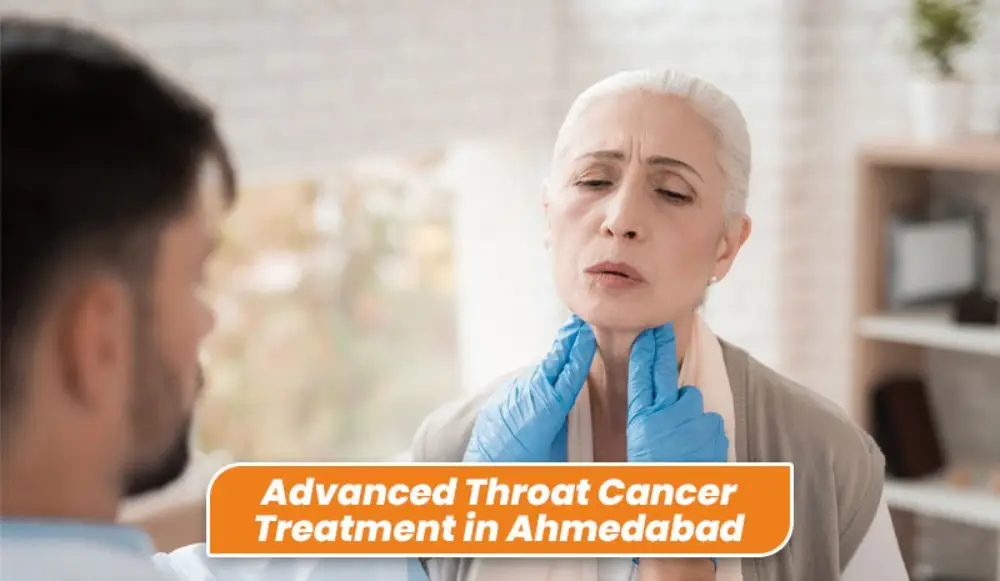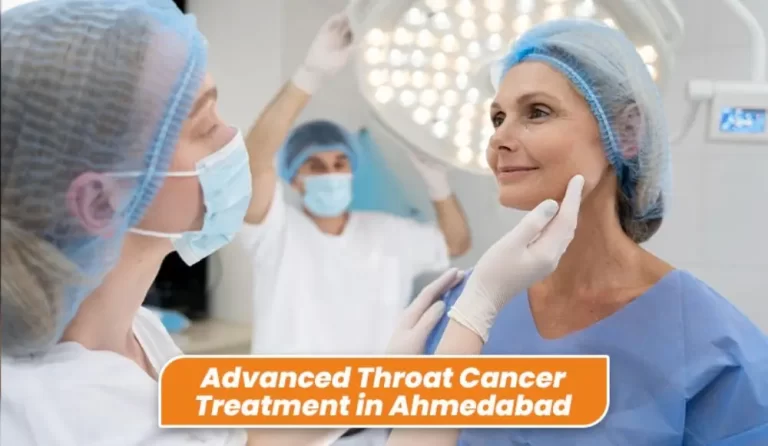Advanced Throat Cancer Treatment in Ahmedabad by Dr. Mihir Mehta

Introduction
Throat cancers include types like cancers of the pharynx, larynx, and tonsils, and if not caught on time, it can prove to be fatal too. Early detection and specialized treatment will be very crucial in improving outcomes so that long-term recovery is ensured. A top ENT specialist, Dr. Mihir Mehta, holds a wealth of experience in diagnosing and treating throat cancers. His approach merges sophisticated diagnostic technologies with tailored treatment strategies, merging surgical and nonsurgical treatments adapted to the needs of each individual.
Throat Cancer Diagnosis
Dr. Mehta engages in an all-inclusive assessment process in the diagnosis of throat cancers. Some common reasons for a diagnosis include persistent hoarseness, difficulty swallowing, unexplained pain in the throat, or a lump in the neck. Dr. Mehta employs multi-faceted evaluation and diagnostic tests to monitor the stage and severity of the condition in question.
Diagnostic Techniques
Laryngoscopy
One of the diagnostic procedures is the initiation of the evaluation of throat cancers, through a laryngoscopy. Dr. Mehta uses a specialized scope to check on the throat, the larynx, or voice box, as well as the adjacent areas, for any abnormalities or suspicious growths. It also helps to see the tissue in much more detail.

Biopsy
If any abnormal area is detected on a laryngoscopy, Dr. Mehta can take a biopsy of that abnormal region. This involves taking a tiny tissue sample from the region which is then placed in a lab for further study. A biopsy is considered the most definitive diagnostic procedure in cases of cancer because it allows pathologists to establish whether cells are cancerous or malignant and, if malignant, classify the cancer type.
Imaging Tests
- Diagnosis and staging of throat cancer also involve imaging tests like CT scan, MRI, or PET scan. These will allow Dr. Mehta to know the size, location, and extent of the tumor, along with whether the cancer has spread to other places like lymph nodes or surrounding tissues.
Early Detection
Dr. Mehta also highlighted early detection as the most important factor. Throat cancers diagnosed early are much easier to treat and patients usually have good outcomes. Check-ups are essential, particularly for those at a higher risk, such as smokers or heavy alcohol users.
Of necessity, surgery is a part of the treatment for many patients with throat cancer, usually especially when the disease is discovered in its early stages. Dr. Mehta is very accomplished in the use of high-tech surgical procedures required to remove cancerous tissue while sacrificing as little normal function as possible. His surgery will be as minimally invasive as possible, and he will aim to keep recovery time as short as possible while also improving postoperative quality of life.
Surgical Procedures
Laser Surgery
For the smaller, early-stage tumors, the doctor advises laser surgery. This is a minimally invasive procedure in which high-powered lasers are used in order to remove very precisely the cancerous tissue and minimize damage in healthy areas. It usually results in quicker recovery times and fewer complications.
Partial or Total Laryngectomy
If the disease has already affected the larynx, which is a voice box, Dr. Mehta may undergo a partial or total laryngectomy. It depends on the extent of the disease. Partial laryngectomy: removal of only part of the voice box, preserving as much of the voice as possible. In very advanced cases, a total laryngectomy is necessary, in which the entire voice box must be removed. Dr. Mehta works with his patients to prepare them for changes in voice function and life after surgery.
Neck Dissection
If the cancer has infiltrated the lymph nodes in the neck, a neck dissection may be performed wherein affected lymph nodes may need to be removed. This is often performed as part of other surgeries in order to ensure all cancerous tissue is removed and recurrence is minimized.
Pharyngectomy
If the cancer is situated in the pharynx, or throat, then Dr. Mehta may offer a pharyngectomy. This surgery can be either partial or total, depending on the size of the tumor and where it’s located. Dr. Mehta does everything that can be done to preserve both swallowing and breathing capabilities during these operations.
Recovery and Rehabilitation
Post-surgical recovery and rehabilitation form the core treatment provided by Dr. Mehta. Speech therapy or dietaries may be needed by patients after surgery depending on what kind of surgery had been done. Dr. Mehta ensures such patients get all the assistance necessary so that patients can regain the lost function or speaking or swallowing; or even see referrals from specialists in speech-language pathologists.
Non-Surgical Treatments for Throat Cancer
Besides surgery, non-surgical interventions are also very important in the management of throat cancers, especially for advanced-stage cancers or those where patients may not be ideal candidates for surgery. Dr. Mehta works in tandem with oncologists to formulate a multi-disciplinary treatment plan that includes surgical and nonsurgical interventions to yield the best results.
Radiation Therapy
Radiation therapy is the most common nonsurgical treatment given for throat cancers, especially in small tumors or as an adjuvant to surgery. High energy rays are directed to kill cancerous cells while sparing as much healthy tissue as possible. Dr. Mehta will prescribe radiation therapy with surgery or radiation therapy alone, depending on the stage and location of the cancer.
Chemotherapy
Chemotherapy uses potent medications that aim to kill or slow down cancer cells‘ production. Chemoradiation is one treatment approach where chemotherapy is used in combination with radiation therapy to enhance the overall impact of both treatment components on a patient. Chemotherapy is usually advised for advanced stages of throat cancer or if the cancerous cells have invaded other parts of the body other than the throat.
Immunotherapy
Immunotherapy is the new possible treatment that is available to encourage the body‘s immune system against cancer cells. Dr. Mehta may recommend immunotherapy for throat cancer patients after other treatments have failed. This has the potential of helping increase the body‘s resistance by attacking and breaking down the cancer cells, thus providing a wider avenue for patients who might be exposed to this disease.
Targeted Therapy
Targeted therapy drugs target cancer cells specifically by interacting with proteins or genes that may promote cancer cell growth. This is less likely to damage normal cells compared to traditional chemotherapy and might be considered for cancers with specific genetic markers. Dr. Mehta assesses whether targeted therapy is appropriate based on the tumor‘s characteristics.
